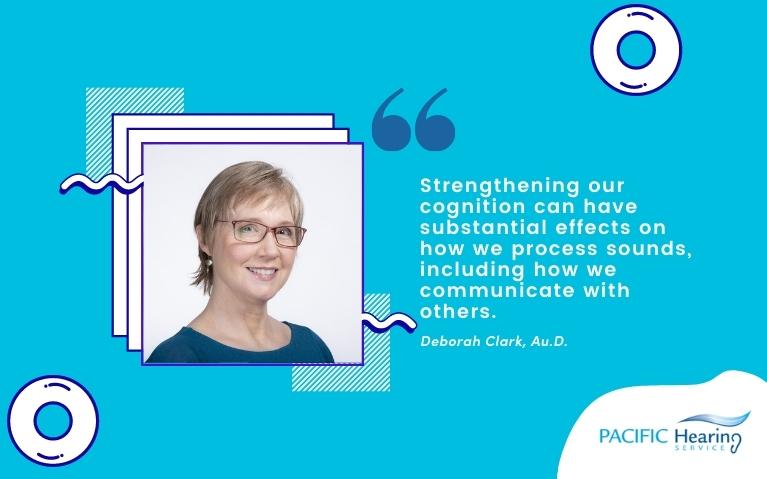Cognitive Screening
PACIFIC HEARING SERVICE
Cognitive Screening
Cognitive Testing Can Detect Decreased Cognitive Function
Supporting Dr. Lin’s research, a ,25 year French study demonstrated an increase in the cases of disabilities, dementia, and depression in elderly men when hearing loss was left untreated.
The way in which hearing loss contributes to an increased risk of developing dementia and early cognitive decline is complex, but because the link between the two is well established, it is cause for concern for our doctors of audiology.
The Pacific Hearing Service team is dedicated to helping our patients and their families live a richer, more rewarding, and more independent lifestyle by providing personalized hearing care. The use of advanced technology cognitive testing to measure how hearing loss is affecting your cognitive health enhances our capacity to meet our objective.
Cognivue Screening is a breakthrough technology for the early detection of cognitive decline and has become an important tool at our disposal.

These doctors go above and beyond to ensure an excellent experience for patients. I recommend them without hesitation.
Pacific Hearing Service in Los Altos does a terrific job. I worked with Dr. Deborah Wilson Clark Au. D. and she was highly knowledgeable, helpful, attentive, and professional. Dr. Clark and the staff are really organized and client-centric. They also give back to the community, including missions to underdeveloped parts of the world to help with hearing care and education. Highly recommended!
Knowledgable. Patient. Friendly. Willing to thoughtfully and carefully answer whatever questions you have. Clearly patient-focused. Committed to education. I feel lucky to have found this excellent team of helpers.
How Are Hearing Loss and Cognitive Decline Linked?
The American Academy of Neurology has classified the link between hearing loss and cognitive decline into four categories.
- Common Risk Factors. Conditions that often accompany hearing loss are high blood pressure, heart disease, and diabetes, which also put you at greater risk for decreased cognitive health. The connection is likely due to blood vessel narrowing, which affects the network of small blood vessels that feed the cochlea.
- Mental Overload. The increasingly difficult task of conducting, analyzing, and processing sound when sound signals are limited or absent, causes the central auditory pathways that process them to become overloaded. To overcome these challenges, other parts of the brain pitch in to help compensate for poorly transmitted sound, using thinking and memory resources to help with hearing instead of cognitive functions.
- Structural Changes. As the areas of the brain used for sound processing see limited or no use, they begin to atrophy or shrink, restructuring the brain and its functions.
- Social Isolation. Social isolation increases by a factor of 52% for every 10-decibel drop in hearing capacity, according to University of British Columbia researchers. It is common among those experiencing hearing loss who find social gatherings stressful and uncomfortable, to avoid social events, social gatherings, and conversations, especially in noisy environments.
What Is Cognivue Screening and How Does It Work?

Cognivue Screening is a specialized tool used by Pacific Hearing Service to help our patients identify and manage cognitive decline. However, it also serves as an advanced level tool for helping our audiologists create the hearing care plan and hearing aid selection that will produce the best results for each of our patients.
A personalized, consistent, and reliable assessment of your overall brain health by measuring cognitive levels in several different areas, is among the features of Cognivue Screening. The test establishes a baseline score used by individuals, audiologists, and physicians to monitor and detect changes, as they develop and prescribe interventions and therapeutic programs to limit or manage decline.
Cognivue screening is:
- A Self-administered test
- Non-invasive
- Interactive and intuitive
- A 10-minute assessment
- Easy to understand with immediate results
- Secure and confidential
Cognivue tests include unique software algorithms that make use of patient responses to adapt the test according to the patient’s performance, improving accuracy by eliminating testing variability.
What Will Your Cognitive Screening Results Show?
Using cognitive screening results, you and your doctor of audiology will have an outline that can be used to evaluate how health conditions, such as hearing loss, are contributing to your specific cognitive levels, making it possible to create a plan of action with interventions and therapeutic responses that limit continuing decline.
Five areas of scoring, each with a direct audiological connection, are reported in cognitive screening results.
#1 – Memory Score
This is your ability to retain information while processing the same or new information, and is a critical element necessary to sort out complex sentences, follow abstract thoughts, and comprehend speech in a difficult sound environment.
#2 – Visuospatial Score
Your ability to process and interpret visual information is reflected in this score. Visuospatial processing goes beyond pure peripheral processing to include the capacity to identify where sound or a voice is coming from. How effectively you use visual cues, along with your capacity to process complex sentences and speech in a degraded sound environment, have a profound effect on hearing.
#3 – Executive Function Score
This score is a measurement of how well you are able to coordinate and control higher order cognitive processes. Executive function guides your level of attentiveness, planning, problem solving, and more skills that help you focus on a single speaker in a noisy environment, or multiple speakers talking at the same time, and your ability to focus on speech during conversation while ignoring irrelevant distractions.
#4 – Reaction Time
Measured in time rather than scored, this result shows how quickly your brain coordinates between stimulus perception and response. It demonstrates your ability to respond within an appropriate time frame when sound or speech dictates a quick reaction.
#5 – Processing Speed
This is the amount of time it takes you to mentally process a task and indicates your ability to follow rapid and/or complex conversations, especially those taking place in a noisy environment.
Schedule a Cognitive Screening at Pacific Hearing Service
Because so many people with hearing loss, on average, put off addressing their condition for seven to ten years, many begin to experience some degree of cognitive decline by the time they come in for a hearing assessment.
Our team of audiologists at Pacific Hearing Service are committed to providing better hearing and an improved quality of life for our patients, which is greatly enhanced by advanced cognitive screening technology.
Struggling with recall, making decisions, organizing tasks, losing your sense of direction, or other cognitive related issues, could mean that you or a loved one is experiencing cognitive decline. Contact our hearing care professionals to know the truth regarding your cognitive health by scheduling a Cognitive Screening using the adjacent form.
News
// NEWS //
You Might Also Be Interested In

What is the Connection Between Cognitive Decline and Hearing Loss?
Not much is known about the causal mechanisms between cognitive decline and loss of hearing, but there are some theories and some much needed exciting new avenues for help in addition to hearing aids.

Pacific Hearing Service Summer Webinar Series: July – How To Keep...
A few weeks back, on July 15, we hosted a free seminar called: How To Keep Your Mind Sharp When You Have A Hearing Loss – and it proved highly insightful and valuable for the 100+ patients who attended.
